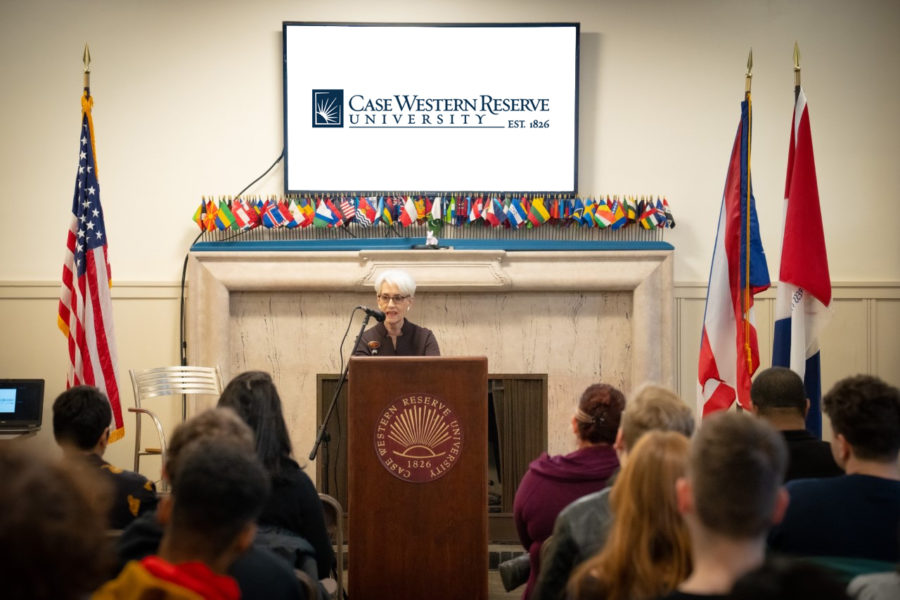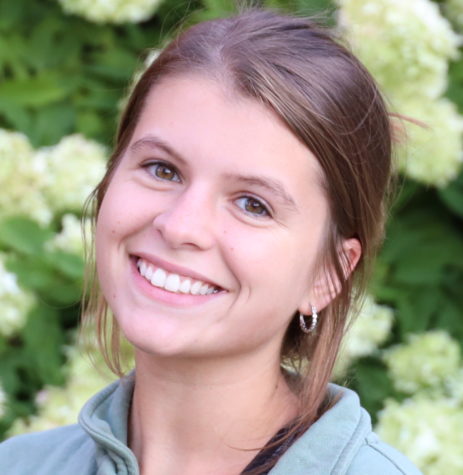US Deputy Secretary of State meets with CWRU students
Courtesy of the U.S. State Department
Deputy Secretary of State Wendy Sherman spoke at CWRU and answered questions ranging from the Russo-Ukrainian War to her main source of inspiration.
January 27, 2023
On Tuesday, Jan. 24, Case Western Reserve University welcomed Deputy Secretary of State Wendy Sherman to our campus, where she gave a brief talk, and answered a barrage of questions from students and professionals alike on her work and perspectives on all things international relations.
In her opening remarks, she started with a small joke about the recent Ticketmaster hearing in the U.S. Senate saying, “And I thought what I really should talk about is the Senate committee hearing today on Ticketmaster.” She added, “You all know what I’m talking about when I…[say that] Ticketmaster really messed up.” She was, of course, referring to Ticketmaster’s mishandling of ticket sales for pop superstar Taylor Swift’s upcoming tour and the ensuing governmental investigation into whether the corporation was a monopoly or not.
Following this, she quickly returned to her business for being there, which was to predominantly discuss foreign relations, including the Russia-Ukraine conflict, which she called an “unconscionable war” and an “act of barbarism on the part of Vladimir Putin and the Kremlin.” Afterwards, many students raised questions specifically inquiring about the United States’ involvement in this conflict.
The first question surrounded the topic of foreign aid: “How do we decide which countries we help and when?” Deputy Secretary Sherman responded quickly, explaining how our involvement in the conflicts of other nations begins with economic and humanitarian interests, and how, because of the unprovoked and unprecedented nature of this attack, it garnered US interests. While Ukraine is one part of our world, they are a major grain exporter and is, as Deputy Secretary Sherman put it, the “breadbasket of the world.” The current crisis in Ukraine is not something we can ignore, she argued, as “it was creating terrible food insecurity everywhere in the world.”
The interests of one country are the interests of others, as globalization continues to connect the entire world. She continued on to explain this point, saying, “So whatever we do, we try to think about what it’s gonna mean, first and foremost, for Americans … and then what does it mean for the rest of the world … [since] we’re all interconnected. So what happens in one place … has an impact all over the world.”
Deputy Secretary Sherman was also asked about her role as a woman, especially in a predominantly male role and in dealing with other nations who do not allow women the opportunity to hold such high offices. She is the first woman to hold this position and has held a number of other positions, including as a professor at the Kennedy School at Harvard. She also boasts the title of the leader of the Fannie Mae Foundation, a partner at the prestigious Doak, Shrum, Harris and Sherman political and media consulting firm, the leader of the ‘88 Campaign for the Democratic National Committee as well as the director of Emily’s List, which is the largest political and financial resource for pro-choice women. In her response, she cited former Secretary of State Madeleine Albright as her main source of inspiration: “And [Albright] said to me a long time ago, when you’re sitting at a diplomatic table, you are not so much Wendy Sherman, or a woman, or a grandma, you are the United States of America.”
She went on to explain that when you are in that role, you are more than just a woman—you are the representative of a huge, successful country and the face of an entire nation, and that comes with an enormous responsibility. The responsibility of the power you possess must be understood by you first in order to be taken seriously by others.
Finally, she explained how having a support group of other individuals like yourself is pivotal in the success of not only your job, but also as a human being: “One of the ways I’ve met those challenges along the way is to always have a support group of other women who can tell me when I’m being a jerk, but also can tell me when I’m doing well.” She did not undermine the struggles that come with being a woman, however, as she called it “a constant challenge.”
She also made a point to try to reach out to CWRU students directly so that they may “take the reins from folks like me, and take on the responsibilities of leadership.” She added, “We need you at the table” because we young people “understand innately how to communicate across borders and cultures, how to build relationships, how to collaborate with counterparts and meet them where they are.”




